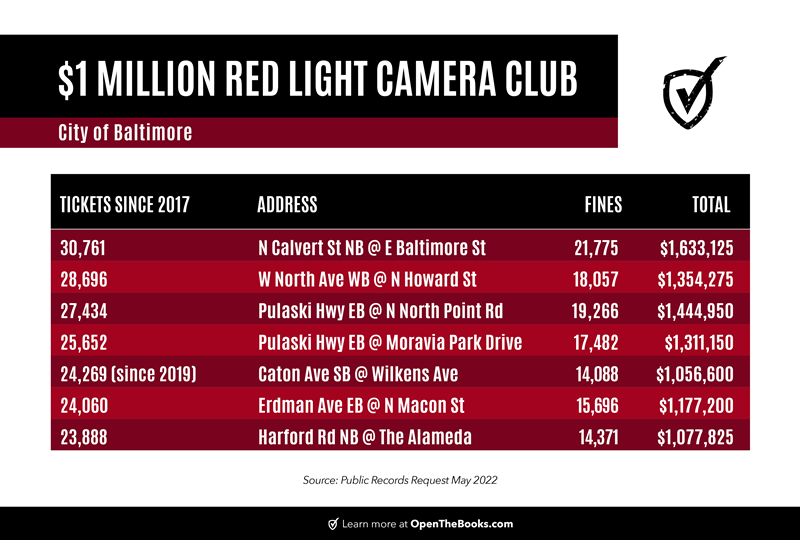

By Adam Andrzejewski
The City of Baltimore has collected between $51 million and $62 million in fines from 143 red light cameras from 2016 through the beginning of 2022.
However, it’s unclear exactly how much the cameras have truly collected for the city since its own Department of Transportation and Department of Finance produced numbers that were miles apart.
The two agencies differ in total fines collected by $11 million. Furthermore, the number of paid-tickets differs between the two agencies by approximately 143,000.
The Department of Transportation (DOT) produced documents showing 678,222 fines were paid since 2017, for a total of almost $51 million. While, the Department of Finance (DOF) says it collected revenues on 821,242 tickets since 2016, for almost $62 million.
Here are some more of our findings:
- People don't pay the tickets: 1.1mm tickets issued and DOT figures show only 680,000 tickets paid and DOF says that only 820,000 tickets paid since 2017.
- Even during the 2020 pandemic, there were 215,000 tickets issued during the period when regular people were hurting.
- There are seven intersections in the $1M Red Light Camera Club -- collecting over $1M in fines over the past five years.
- There's been a six fold increase in cameras, tickets, and fines since 2017 from 50,000 tickets issued to nearly 300,000 tickets per year and revenues up from $2.5 million to nearly $15 million.
- Just last year (2021), DOT and DOF figures on paid-ticket revenue differ by $3 million!
Each ticket issued by the red light cameras is subject to a $75 fine. (All the data collected for this investigation was produced subject to an open records request from our auditors at OpenTheBooks.com.)

DOT Red Light Ticket and Revenue Figures
Transportation’s data shows the city’s red light cameras first coming online in 2017 with only 23 cameras. Then, officials added more cameras every year — 85 cameras in 2018; 110 cameras in 2019; 142 in 2020; and the 143 cameras in 2021 and 2022.
In 2017, with 23 cameras, the city issued 46,008 tickets and collected 34,186 fines – for revenues of $2,563,950.
In 2018, with 85 cameras, the city issued 215,359 tickets and collected 162,993 fines – for revenues of $12,224,475.
In 2019, with 110 cameras, the city used 272,472 tickets and collected 171,007 fines – for revenues of $12,825,525.
In 2020, with 142 cameras, the city used 215,540 tickets and collected 144,730 fines – for revenues of $10,854,750.
Last year, with 143 cameras, the city used 277,152 tickets and collected 156,443 fines – for revenues of $11,733,225.
So far this year, 143 cameras issued 38,388 tickets, with 8,863 fines paid – for $664,725.
DOF Red Light Ticket and Revenue Figures
Finance produced documents showing that, the city began giving out red light camera tickets in 2016, collecting $17,839 from 238 paid tickets.
In 2017, the city issued 17,965 paid-tickets for $1,347,370 in revenue. In 2018, the city issued 152,528 paid-tickets from 85 cameras that brought in $11,439,617.
In 2019, the city issued 198,586 paid-tickets from 110 cameras that brought in $14,893,931. By 2020, the city brought in $11,608,778 from 154,784 paid tickets.
Last year, the city issued 198,414 paid-tickets for revenues of $14,881,031.
So far this year, 98,727 paid tickets brought in $7,404,536.
A city spokesman didn’t have time to respond to our request for comment, including to explain the $11 million discrepancy.
Three new red light cameras that went online March 14, 2022 aren’t on the list provided by the DOT and neither are the three that were added in October 2021.
In January 2021, Fox45 Baltimore reported that the city plans to add to its already-numerous camera program — consisting of 135 speed cameras on top of the 140 red light cameras — planning for another 45 speed and red light cameras.
This isn’t the first time the city has had systemic problems in its red light camera program.
Its previous network of red light and speed cameras was shut down in 2013 for wrongfully issuing tickets, the Baltimore Sun reported.
Shuttered for four years, an audit showed that at least 10 percent of the citations were wrong, Fox45 Baltimore reported.
Speed camera violations cost $40 and weren’t included in the city figures provided to OpenTheBooks.com.
.png)
.png)